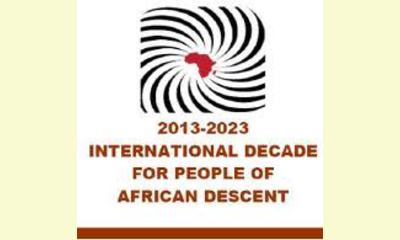|
|
Tribute to Ancestors
un articulo por Rev. Elder Buddy Larrier
People of African descent globally must thank God for the goodness bestowed upon us. We must also pay tribute to countless ancestors for their contributions and sacrifice in bringing us to this stage. We shall name but a few; His Excellency Marcus Masiah Garvey, Malcolm X, Martin Luther King Jr. Rosa Parks, Harriet Tubman and the list goes on. Many people the world over are gradually coming to terms with the importance of the presidential election of Tuesday, November 6, 2012 in the United States of America (USA) that created history by returning a black man to the position as President with a mandate for closing the gap between the rich and poor. This election is considered the most expensive and blatantly racist of all elections in the history of the USA.

click on photo to enlarge
Persons who understand history must conclude that the importance of a “Black Family” in the “White House” for another four years during a ‘Decade for People of Afrikan Descent’ 2013-2023 as designated by the United Nations (UN), and at a time when Afrikan people are also advancing the cause for a ‘United States of Afrika’ by 2017, with the Diaspora as its sixth region, know that these events occurring simultaneously are not coincidental, but are a sign of HOPE that the “Black Afrikan Family” is being restored to its rightful position.
The UN’s ‘Decade for People of African Descent’ (DPAD) starts January 1, 2013, this date also marks the 209th anniversary of Haiti’s independence, which was a sign of HOPE in 1804 that the transatlantic trade in Afrikans was at an end. The UN has further called on national and international bodies for a date to be observed annually as an ‘International Day for People of African Descent’ (IDPAD) during the decade. The 12th October has been put forward as a most appropriate date for the IDPAD commencing 2013. It was on this date 12th October in 1492 that a European expedition under the command of the Spaniard Christopher Columbus and navigated by Afrikans (Moors) made landfall in the Americas. The 12th October 1492 would not have been a day of conflict, but of rejoicing, of celebration after weeks at sea. It is most probable that immediately following landfall there would have been encounters and negotiations with the indigenous peoples of the area to secure food and water, and the Afrikans navigators would have acted as go between for the Europeans.
This view point of 12th October 1492 and the contributions of Afrikans to this historic adventure were written out of history due to the disastrous invasions by Europeans into other lands. As a result, for hundreds of years since the 12th October 1492 Europeans claimed this date as “Columbus Day” and “Discovery Day”, which subsequently became controversial.
In 2001 the United Nations held a World Conference against Racism, Racial Discrimination, Xenophobia and Related Intolerance in Durban, South Africa from August 31 to September 8, 2001. This conference concluded with consensus that the transatlantic trade in Afrikans, slavery and colonialism were crimes against humanity. The conference produced a Declaration and Programme of Action as a call on Nation States to address the legacy from the 12th October 1492 period and to repair the damage (reparations). Therefore, if there is a future for the world it must be built on truth, justice, healing and reconciliation.
(This article is continued in the discussionboard)
|








|
DISCUSSION
Pregunta(s) relacionada(s) al artículo :
The African Diaspora, Does it make a special contribution to the culture of peace?
* * * * *
Comentario más reciente:
:
The article, Tribute to Ancestors by Rev. Elder Buddy Larrier, reminds us of people of African descent who have made a special contribution to a culture of peace, including Marcus Masiah Garvey, Malcolm X, Martin Luther King Jr. Rosa Parks and Harriet Tubman. As he indicates, a full list would be much longer.
Sometimes in the course of history, an oppressed people later becomes the oppressor, but that has never been the case for the peoples of Africa who were transported in chains to the New World and enslaved to create what is now the wealthiest part of the world. Instead, they have provided us some of the best lessons of non-violent resistance and struggles for human rights and dignity.
In another article, Report on the Global African Diaspora Summit, Larrier reminds us that this is not just an historical fact, but that the African diaspora is a potential force for the future transformation to a culture of peace.

|
|









